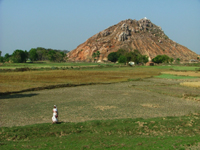
After an interminable, nauseating journey from Bodh Gaya, I reached the hellish town of Gaya, where the dust had already muted the Holi colours splashed over walls and pavements. I took a cycle-rickshaw from where the shared vehicle had dropped me to the railway station, arriving with half an hour to spare. Physically I felt pretty run down: I still have a slight head cold; I've not been sleeping or eating properly - the latter due to everywhere being shut for Holi; I felt rather light-headed, the result, I think, of caffeine withdrawl. Mentally, emotionally and spiritually, though, I felt energised and on top of the world, and very positive. I enjoyed the train journey immensely, and sat glued to the window, listening to music, and feeling happy to be alive. This time the journey between Gaya and Varanasi took just three hours, rather than the seven hours it had taken me on my journey to Gaya.

At Mugal Sarai station I ganged up with a nice Dutch couple for the seventeen-kilometre rickshaw ride to Varanasi, and we bartered hard to get something approaching a fair price. For a change I hadn't chosen a hotel to stay in, instead leaving it to fate to decide for me; the Dutch couple had selected Hotel Alka, on the banks of the Ganges, in the Godaulia district of the old city, so I went with the flow. The streets in Godaulia are narrow and steep, and unaccessible to rickshaws. Our driver parked up, and told us he would help us by walking with us to the selected hotel. I knew that this was not out of the goodness of his heart, but because the rickshaw mafia claim commission of up to 80% from the hotels, for each night a punter stays. It was dark already, and the area is difficult to navigate at the best of times, so we had little choice.
He told us that it was a ten- to fifteen-minute walk, although I am sure it was longer. Typically, my bag was exceptionally heavy, as I'd bought souvenirs intending to post a parcel home in Bodh Gaya. When I went to the small post office there they had run out of stamps, so I had to lug the extra three kilos with me. I stared at the pavement as we walked, watching my step so as to avoid slippery cow pats, and burning embers of fires lit in the middle of the path. We wound this way and that through the warren of streets, and I felt sure that I would never be able to find my way out again.
We spent an hour or so faffing around at the Hotel Alka, while the employees put the already high prices up before our eyes. In the end we abandonned the place, and went instead to the Puja Hotel. Here I secured a big, clean, ensuite room, with a monkey-proof balcony (Varanasi's monkeys are notorious vandals and theives) with a view of the Ganges for 300 rupees. It's more than I usually like to pay, but a good deal. Best of all, in my eyes, the ceiling of my room is painted with countless glow-in-the-dark stars - I'm a sucker for that sort of thing! I tried to get a lower price by suggesting to the receptionist that I'd tell the driver I'd stay just one night, but actually would stay for at least four. He'd go no lower though, and I'd had enough of traipsing the dark alleys fully laden.
I met the Cloggies at the rooftop restaurant for dinner, and we watched in awe as a blood-red moon rose over the Ganges. The hotel is very near one of the cremation ghats, and the breeze blew the smoke in our direction. From my vegetarian point of view, I felt it was no different to smelling a barbeque; burning flesh is burning flesh. The waiter told us the wind normally blows the other way. He told us to be careful of touts on the street, or anyone that approaches us in a friendly manner. He also said that the men collecting money for wood to burn the bodies of the poor are all tricksters, and we should not give them even one rupee, as they will spend it on drink or drugs; there's a serious heroin problem in Varanasi, from what I've read, and it's not confined to locals.
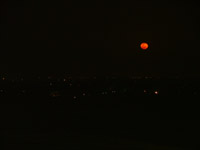
Bodies are brought to the ghats as soon as possible after death, once all the family have gathered; they are kept on ice if the delay will be long. It takes just three hours for a corpse to be cremated. Only the men accompany the dead, as the women are soft-hearted, and cry so much that the deceased my have trouble leaving the corporal world behind and journeying onward. It is not the done thing to take photographs from the ghats of the funeral rites - you will be in for a hefty backsheesh at the least if caught, possibly a bit of mob justice. If you want to take pictures, take a boat trip along the river, and do it from there. I'm undecided as to whether or not I will use my camera or not.
18/3/06, 0725 hours
I am utterly overwhelmed and madly in love with Varanasi!
Desptie my tiredness I found it hard to sleep last night; I was so excited to be in this holiest of Hindu cities. My mind raced and I found myself - for some unknown reason - driven mad by trying to remember the names of all my teachers at school. My mind has a mind of its own. I dropped off sometime after one, but was awoken at half-past two by people talking loudly in the corridoor. I managed to get back off a while later, and woke the next time when my alarm went off at 0550.
I opened the doors to my balcony, and looked out into the subued light of a new day. I'd timed it perfectly as, before my eyes, the pinky red sun glided out of the pollution on the far side of the river. Full of wonder I watched as the sun rose over the Ganges, while monkeys clambered over the mesh surrounding the balconies, and groomed one another on nearby buildings. Little row-boats and ships resembling junks floated along on the water, and smoke from the burning ghats drifted up into the air. I felt unbelievably high on life.
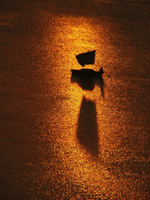
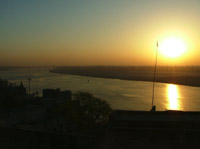
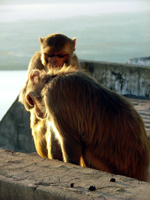
Varanasi is in Uttar Pradesh, the same state as Agra, and I'm back in the land of kabootars and kites. The kabootar baz - the pigeon fanciers - direct their flocks of pigeons from the rooftops, with cloth tied to poles, and the enticement of grain. I watched from the roof whilst eating my breakfast, and observed life above the buildings of Varanasi. On one rooftop two tethered goats bleated; on another a young boy arranged cow-pat pies in the sun to dry - they are used as fuel; a third had a small girl hanging out washing, while her grandparents brushed their teeth, spitting over the side of the building. I looked along the length of the river, seeing temples and ghats disappearing into the mist. I am totally under India's spell.
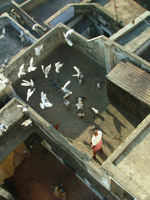
18/3/06, 1125 hours
What a great morning! I left the hotel after breakfast, getting lost almost immediately. I managed to make my way through the winding streets to the river, passing cows and playing children on the way. I came out right next to the huge stacks of wood on Manikarnika Ghat, the main cremation ground, so quickly stashed my camera and turned right. I headed South along the concrete steps - retrieving my camera once I'd turned the corner, and was out of sight of the burning ghat. By the time I'd reached busy Dashaswamedh Ghat, the grin on my face was huge, and I had to keep reminding myself to breathe I was that excited.
Forget the rule of not smiling at men, I couldn't stop myself from smiling at everybody. I said "namaste" to everyone I made eye contact with - hands held in front of my chest, palms pressed together - and found the locals to be a friendly bunch. As in Agra, despite warnings about aggressive touts, I had no trouble. I think this was helped by the fact that I was dressed in Indian style, and my tiny Hindi vocabulary; there are much easier marks in this tourist mecca.
I continued past ghats favoured by dhobis - washermen - slamming their laundry against propped-up stones, and spreading the clothes out to dry afterwards. A multitude of boatmen lined the way, trying to entice me into a ride on the river, but I declined; I'm saving that for tomorrow. I passed numerous dogs, some almost hairless with mange. Puppies hid in holes in the ground to escape the rays of the sun, which was hotting up by now. At one point a river - or possibly a sewer - poured into the Ganges, and around here herds of water buffollo wallowed in the dirty water, pulling faces at me while I photographed them. I saw the occasional bloated corpse floating along, but only those of animals; no human remains.
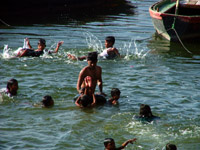
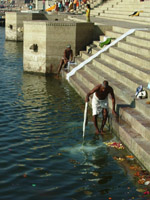
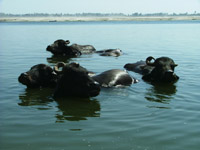
I reached Asi Ghat and turned around, retracing my steps in the heat. I paused along the way to watch devotees led in religous rituals by holy men; fishermen casting lines; children sliding down slopes and splashing about in the river. My guidy book warns against joining the bathers clensing their souls in the holy - but incredibly polluted - water, but I couldn't resist splashing just a little on myself - being careful not to slip on the wet, moss-covered concrete, and go for a full submersion. I returned to the hotel after eleven, feeling my mind had been blown by this, surely one of the most amazing places on earth.
 Visit SerenityPhotography.co.uk, where you can buy beautiful pictures from around the world...all taken by yours truly! |